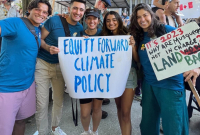It’s a time for big feelings. Feel them.
We will move forward to build a world aligned with long-term wellbeing for all. Today, though, we work on shoring up our personal foundations.
Many of us are doers. We want to spring into action, make things better. We are tempted to blur bad spirits with substances of various descriptions. However, when we shove aside our feelings or try to step over them on our way to a goal, they inevitably show up later in our bodies or pop out sideways to surprise us in our interactions with others.
This colours our internal narrative, our position on the fight-or-flight spectrum and, thus, our neurobiology, the energy and ideas available to us, our relationships, our work and, therefore, our outcomes.
Let’s not give them that.
What comes next must come from a good place.
Many of us spend many hours working to stabilize Mother Earth. It wasn’t until I took a class with contemporary dance guru Margie Gillis and she invited us to “Dance the little part of nature you walk around in every day,” that I realized that I needed to start with my own ecological foundation — my body.
Our bodies are wonderful structures, but they need tending. Having grown up as a prototypical Type “A” perfectionist, I progressed into the hustle of medicine, with its mandatory sleepless nights and suck it up mentality.
It took me burning out twice to allow myself the time to do this properly. Adults need seven to nine hours of sleep every day to function at our best — we should routinely allow ourselves at least an eight-hour sleep opportunity.
I now wear an Oura ring because it seems that a data-driven approach is what is required for me to create this space for myself. Other evidence-based measures for enhancing wellbeing on a day-to-day basis include exercising for 30 minutes most days, spending time in nature, and taking the time to be present with our loved ones.
Avoid too much alcohol and caffeine — they can affect your mood and will definitely impact your quality of sleep.
Put away your phone. Yes, we need to make a plan, but we don’t need to doomscroll — it’s not helping your nervous system be its most centered self. When the time comes, choose a trusted source, learn the information you require to make decisions, and strategize in a focused way.
Clinical Psychologist Tara Brach offers a “RAIN” meditation as a way of acknowledging and working through emotions.
“Recognize what is going on;
Allow the experience to be there, just as it is;
Investigate with interest and care;
Nurture with self-compassion.”
When I did this earlier today, I recognized emotions of anger and grief. I sat there and breathed, allowing (forcing? ☺) myself to be present with them. If you find this difficult or unappealing, you’re not alone.
Caroline Hickman, the lead author of the first global study into ecoanxiety told me, “Grieving is a tough sell.” She believes though, that welcoming and spending time with the full spectrum of emotions is necessary for us to move forwards as our whole selves.
And that’s what we need for the walk towards wellbeing, my friends. There will be days together for work with the head and the hands — planning and organizing and acting.
But today we start with the heart.
Dr Courtney Howard, Medical Doctor (MD), Master of Public Policy (MPP), CCFP-EM






Comments